- Home
- Allan Topol
The Italian Divide Page 10
The Italian Divide Read online
Page 10
Zhou didn’t like the English. He viewed them as cynical and hypocritical, pretending to follow rules of fairness while they had raped and plundered China. Their efforts to get the entire Chinese nation hooked on opium because it was commercially advantageous to them was even more reprehensible than their participation in the African slave trade. Now finally they had been relegated to their just position on the world stage—as bystanders with delusions that they would one day return to their former glory. Their future was grim. They would have all they could do to ward off internal resurrection by a hostile Muslim populace constantly increasing in size.
Zhou watched McKnight squirm in his chair, while waiting anxiously to hear why Zhou had summoned him. Though McKnight was the President of Victoria Bank in Hong Kong, he served at the will of Zhou because Zhou had engineered a secret takeover of the Victoria Bank by the Commercial Bank of China, which Zhou owned. To the outside world, Victoria Bank was independent. In reality it was a subsidiary of Zhou’s bank. Chinese law permitted this deception.
Zhou glanced at the sweep second hand of his Rolex. When a full minute had passed, he began talking. “Turin Credit is Italy’s largest bank. Alberto Goldoni, the CEO, is the biggest stockholder with 18 percent of the stock. I want you to go to Italy and purchase Goldoni’s stock. Go up to a purchase price of 20 billion euros. I’ll secretly put up the cash. Of course, I’ll want final approval of the transaction, but I want you to keep my involvement confidential. That amount of stock should give you control of Turin Credit. After you obtain it, you’ll secretly transfer ownership to my Commercial Bank of China. You’ll continue to serve as a front even after control is transferred. Do you understand?”
“What makes you think Goldoni will sell?”
“As we both know, everything is for sale if the price is right. Besides, I’ve heard, and I’m sure you have as well, that most Italian banks are struggling because of their bad loans. Some are searching for ways to get out from under this problem. An infusion of foreign capital will be attractive to Goldoni.”
McKnight shook his head. “I know a little about Turin Credit. Their balance sheet is sound because of good management by Alberto Goldoni. He and I have spent time at a couple of international bankers conferences. He explained to me how much Turin Credit means to him because the bank was started by his great-grandfather.”
“All I’m asking you to do is buy Goldoni’s interest and you’ll have control of the bank.”
“I suppose that’s right, but it won’t be easy.”
“In return for doing this, I’ll pay you a bonus of 5 million yuan at the end of the year. Now do you have any questions?”
“After the investment by Pacific Sun in the Milan bank and in banks in Verona and Bologna last year by Chinese banks, I’m afraid the Italian government, the EU, or the United States may intervene to block this transaction. They’ll realize that in dealing with a bank as large as Turin Credit, an 18 percent stake will give the owner effective control.”
Zhou brushed aside McKnight’s comment with a wave of his hand. “You worry too much. Italy knows its banks are weak. It will welcome the infusion of foreign capital. The EU is a toothless entity. As for the United States, I have leverage and a powerful voice in Washington to prevent the United States from intervening. Anything else?” Zhou’s tone was dismissive. He didn’t want any more questions, but McKnight wasn’t finished.
“Suppose Alberto refuses to sell?”
“Remind him what happened to his friend Federico and let me know. I’ll take steps to change his mind.”
McKnight’s arm was shaking and his gait wobbly as he left the office.
Five minutes later, Zhou’s secretary buzzed. “President Mei Ling would like you to come to her office.”
Zhou’s face reddened with anger. He wasn’t a schoolboy to be yanked around by the teacher. He and Mei Ling had regular meetings once a week. That should suffice for her. Still, he couldn’t ignore the request.
“Tell her I’m in an urgent meeting which should last about another hour. I’ll come then.”
Zhou left his office and walked along the corridor to his private exercise facility two doors away. He changed into workout clothes and climbed on a bike.
While pedaling furiously, he cursed about that bitch Mei Ling under his breath and wondered what she wanted today.
If she raised the subject of Italy, he’d tell her as little as possible about his bank takeover plan. And in no event would he mention Parelli or his meeting with the politician.
* * *
Entering Mei Ling’s office an hour and a half later, Zhou received a frosty greeting. She doesn’t like me any more than I like her, he thought. He knew Mei Ling had made him Finance Minister with great reluctance and only because he threatened to arrange a military coup, using former colleagues of his brother, if she did not.
The two of them sat down at an octagonal conference table and glared at each other.
“You wanted to talk to me?” he said curtly.
“Yes. My financial assistant has observed large treasury outlays for banks in Italy. You never consulted me about those. I want to know what’s happening.”
Zhou bristled at the idea she was checking up on him. In fact, he had used treasury funds for the three Italian bank investments in Verona, Bologna, and Milan, although the purchases were being made by fronts and ultimate ownership would be in the bank he owned.
Indignantly, he replied, “I’m doing what’s in the best interests of China.”
“I’m sure it is. I just want to know about it.”
“I have a grand strategy to restore China to its former greatness.” As if lecturing a student, he continued in a condescending tone, “Many people, not you of course, are unaware of our incredible history. They believe that China stepped from nowhere onto the world stage in the twentieth century. The reality, of course, is that during the Ming Dynasty before Christopher Columbus, our ships were traveling from the South China Sea to cross the Indian Ocean and sailing as far as Africa. There is no doubt we would have gotten to the Western hemisphere before the Europeans if our narrow minded emperors hadn’t decided to pull back from world exploration.
“During the Qing Dynasty we became world travelers again. China was so prosperous in the eighteenth century that some Americans proposed that the United States look to China as a model of successful development.
“At the beginning of the nineteenth century, China controlled one third of the world’s total output. Our GDP and consumption of luxury goods exceeded that of Europe. Then the countries of Western Europe, led by England, conspired to weaken China while they surged ahead economically.
“Now that we are an economic power, it’s payback time. We can gain a foothold in Europe from which we will exert major influence over their economies. I intend to do that by having us take over much of Italy’s banking industry. In the 21st Century, whoever controls the banks controls the economy and the country.”
“Thank you for that history lesson. But why Italy?” She asked nervously.
“To start with, most of the top banks in Italy are in trouble financially. That was the conclusion of an inspection last year of Italian banks by the Bank of Italy. They don’t have enough assets to guard against losses on bad loans. Fifteen percent of their loans are not being repaid on time, defaults are increasing, and they don’t have enough capital to cover their anticipated losses. In other words, their entire banking system was on the verge of collapse. Yet the Bank of Italy, their bank regulatory body, had a rule prohibiting foreigners from owning any portion of a bank.
Last June, at a world economic conference in Ascona, Switzerland, I spent time with the head of the Bank of Italy, called the Governatore. His organization regulates the banking industry. I convinced him that the infusion of foreign capital is critical to save their banks. He assured me that the Bank of Italy would not take any action against foreign ownership as long as their holdings were less than 20 percent. I had thought he wou
ldn’t go above 10 percent. So I was personally surprised. Twenty percent is huge. In the case of a large bank, 20 percent ownership usually gives a shareholder effective control. The Italian government is likely to press them to put up additional capital, which they won’t be able to raise. All of this makes them vulnerable to an outside takeover.”
“What about other countries in Europe?”
“England, Germany, and France are too large to focus on initially. Italy is next in size right after them, and Italy is in the heart of Europe. After I control the Italian banking business, I’ll move onto other countries in Europe.”
“You think you’ll have enough money to do what you want?”
“Absolutely. I also have the option of entering into an alliance with Qatar. I’ve had discussions with their Finance Minister. He’s prepared to use their banks and oil money to work with me. He’d like a foothold in Europe as well.”
Mei Ling looked worried. “What about the United States? Won’t they intervene to block you?”
“I have leverage. I’m confident I can keep them out.”
He was relieved she didn’t ask him to explain his strategy for dealing with the United States. He had no intention of doing so.
Zhou looked across the table at Mei Ling. The ball was in her court. Would she dare to challenge him and try to block what he was doing?
She sighed deeply, and finally said, “I am in favor of restoring China to its former greatness, but I don’t want to create enemies in Europe. So proceed carefully and keep me informed.”
He barely suppressed a smile. She was afraid of crossing him. He could move ahead with his plans for Italy.
Turin
Alberto Goldoni was dreading this meeting. Parelli had called yesterday to arrange it. He had no doubt that Parelli would try to persuade him to extend the deadline for repayment of the overdue loans and mortgages on his farm and wine business.
Early this morning, sipping a double espresso at the desk in his office, Alberto had reviewed the loan sheet on Parelli. The total outstanding debt Parelli owed to Turin Credit was 310 million euros. Last week Alberto had obtained an appraisal of the mortgaged property. It came in at 202 million euros. That meant if he foreclosed now, he would lose 108 million euros.
To compound the problem, the appraiser also warned that property values in this part of Piedmont were declining, and that Parelli’s winemaker, responsible for elevating their wines to compete with Gaja and Antinori, had an aggressive form of prostate cancer. The winemaker was facing death in a matter of months. That fact had been concealed from the public. So if Alberto didn’t foreclose now, his losses for the bank would mount.
After he drained the rest of his coffee, Alberto closed his eyes and leaned back in his chair, recalling how he had gotten into this awful position. He owed it to two factors. The first was the business relationship between the Goldoni and Parelli families. Alberto’s great grandfather lent the money to Parelli’s grandfather to start the winery. Over the years, Turin Credit had made loans to the Parellis for expansion or after bad weather devastated a harvest. Those loans were small in comparison with what Parelli owed now.
The second was Parelli’s charm and charisma. The man was worldly and fun to be with. Alberto and Dora had many memorable dinners at the Parelli’s farm. The usually prudent banker had dropped his guard when Parelli, while vague about the platform for his New Italy Party, had asked for a large loan secured by a mortgage to launch his campaign. “Italy was once a great country,” Parelli, his face flushed with enthusiasm, his voice strong and vigorous despite his age of 70, had told Alberto. “I want to restore that greatness.”
Goldoni had seen the warning clouds when Parelli fell behind on his mortgage payments, but the smooth-talking candidate spoke of promises he had received of large contributions if he continued to surge in the polls, and added, “We have just bottled our best wine ever which will bring a strong infusion of capital.” Alberto was dubious about Parelli’s puffing. Normally prudent, he had realized there were problems with the large loan, but he had been willing to take a chance that some smaller ones would get Parelli over the hump. Now, he realized the foolishness of what he had done.
It was time to shut down a bad situation before it became worse.
Once his secretary announced on the intercom, “Signor Parelli is here,” Alberto was strong in his resolve. By calling the loans, he would be a sensible businessman. Any other decision was foolhardy.
“I was sorry to hear about your friend Federico,” Parelli said.
“He was a wonderful man. It was tragic.”
“Unfortunately, I couldn’t attend the funeral. I had campaign commitments that couldn’t be canceled.”
“I understand.”
“When I was a lawyer in Milan, Federico took me to lunch. He told me about the relationship between your families. He also made an effort to get my business, but I declined. I told him there was no way I would ever leave Turin Credit.”
What an outrageous lie, Alberto thought. Federico had called him immediately before and after the lunch that Parelli had initiated. He reported to Alberto that Parelli said he was unhappy with Alberto’s bank. If Federico offered him financing at a lower rate, he would move all of the family’s business from Turin Credit to Federico’s bank. Federico had declined, and that’s when he had explained about the relationship between Federico and Alberto’s families as his justification for refusing the offer. In Federico’s words, repeated to Alberto, “I could never do that to my friend, Alberto.”
Alberto pointed to a small round table in a corner of the office, signaling they should sit down and start their meeting. But Parelli wasn’t ready for that.
He walked over to a credenza along one wall and picked up a picture of Alberto when he was eight with his grandfather. They were both on horses. The old man was teaching Alberto to ride.
“He was a wonderful man,” Parelli said. “Your grandfather—he and my father were close.” He held up two fingers of his hand pressed tightly together. “Like brothers.”
Alberto nodded. Parelli’s charm offensive was going full force. It kept on rolling. He turned to the photo taken last year in the law school courtyard in Bologna where Alberto’s daughter Ilana was a student. Alberto, Dora, and their son, Ricardo, were in the picture with Ilana.
“My oh my,” Parelli said. “Ilana has become such a beautiful young woman.”
“Thank you.”
“Is she studying law at Bologna as she planned?”
“She is and doing quite well.”
“I’m not surprised. I remember when you invited me to a religious service at the synagogue in which she spoke. Her brilliance was evident then.”
Alberto was anxious to change the subject and get down to business. “Enough about my family.”
They sat in chairs across the table.
Parelli had asked for the meeting. Alberto let him talk first.
“Thank you for agreeing to meet with me, Alberto.”
“You owe a significant debt to this bank. Which is long overdue.”
“And I’ve also been a good client over many years. As was my father. Indeed, your great-grandfather lent money to my grandfather when he started making wine. The Parellis have always repaid every Lira or euro to your bank.”
“That’s all true, but …”
“I’ve come to ask you to lend me another twenty million euros.”
Alberto was dumbfounded. He had expected a plea for additional time. Instead, Parelli wanted more money. The man had incredible nerve.
“I thought you would want to talk to me about repaying what you owe.”
“In due time, Alberto,” Parelli’s voice was soft, his tone reassuring. “But now my election campaign is gaining enormous momentum. I need just a little more cash. This twenty million will give me enough of a boost in the polls that increased contributions will flow into my treasury.”
“With all due respect, Roberto, that’s what you told me when
I gave you the last two loans.” Alberto sounded respectful but firm.
“Well, we have increased our fundraising.”
“It seems to me as if you’ve increased your spending by an even greater amount. The latest polls show you losing ground.”
“They’re wrong. If I had more money, there wouldn’t even be a question about where I stood in the polls.”
“I’m very sorry. I can’t lend you anymore. I’ve decided to call the loans and to foreclose on the mortgages.”
Parelli’s looked as if he had been punched in the stomach. He had an indignant expression on his face. Alberto wondered if he was surprised or posturing.
“Haven’t I always repaid what I borrowed?”
“Yes. Until now.”
“And if you give me a little more money and some additional time, I’ll repay what I owe now.”
“The loans are already six months overdue. Two weeks from today on June 20th, I intend to foreclose on the properties.”
Parelli looked pale and terrified. It was obvious to Alberto that Parelli had never expected this. “I won’t be able to meet that deadline,” he stammered.
“I’m very sorry.”
Parelli recovered and pounded the table. “I’ll be ruined. That’s what you want to do. Ruin me like my enemies.”
“That’s not it at all.”
Parelli was on his feet and shouting while waving his arms. “The winery and the farm have been in my family for generations. I’ll be finished financially.”
When Alberto rose, but didn’t respond, Parelli continued blustering, “It’s not just me you’ll be wrecking. It’s this great country of Italy. My party, the New Italy Party, can provide a fresh start to this country. You’ll be depriving all Italians of their future. Don’t you love Italy?”
Alberto didn’t want to argue politics with Parelli. His great-grandfather had been a hero in the Italian Cavalry in the First World War. Later, he came back to Italy while he could have stayed in New York and became a successful banker after the Second World War. Alberto did love Italy as his family had for generations. And that reinforced Alberto’s decision refusing to extend Parelli’s loans. In his view, by dividing Italy, Parelli would be destroying the country.

 Conspiracy
Conspiracy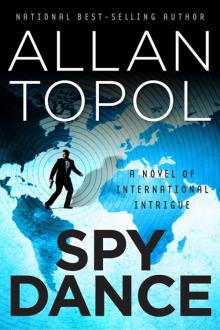 Spy Dance
Spy Dance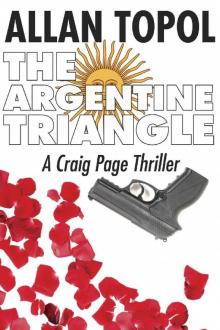 The Argentine Triangle: A Craig Page Thriller
The Argentine Triangle: A Craig Page Thriller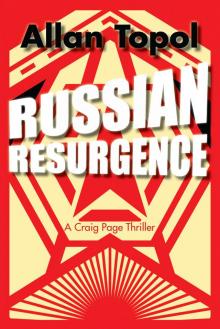 Russian Resurgence
Russian Resurgence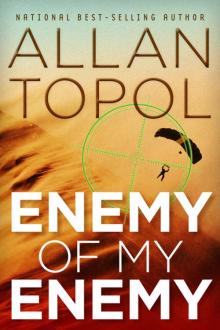 Enemy of My Enemy
Enemy of My Enemy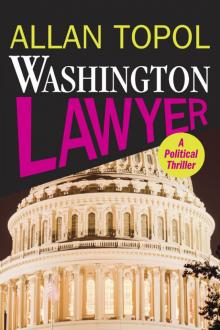 The Washington Lawyer
The Washington Lawyer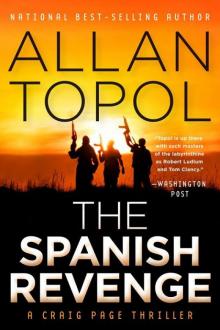 THE SPANISH REVENGE (Craig Page series)
THE SPANISH REVENGE (Craig Page series)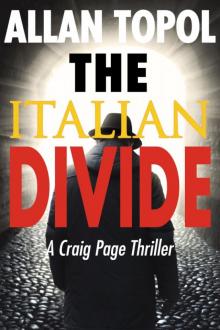 The Italian Divide
The Italian Divide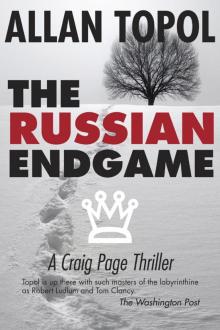 The Russian Endgame
The Russian Endgame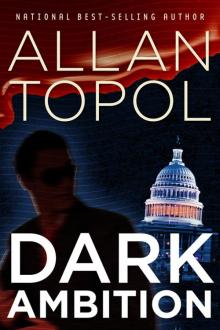 Dark Ambition
Dark Ambition